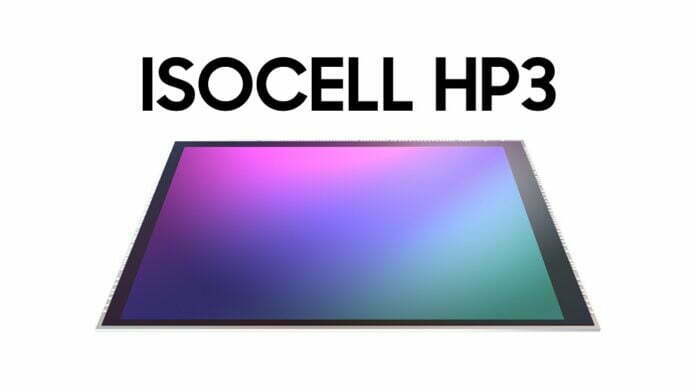ISOCELL Image Sensor
The 200MP HP3’s 12% smaller pixels can reduce camera module area by 20%
The Super QPD solution enables more accurate and quicker auto-focusing
Samsung Electronics, a world leader in advanced semiconductor technology, today introduced the 200MP ISOCELL HP3, the image sensor with the industry’s smallest 0.56-micrometer (μm)-pixels.
“Samsung has continuously led the image sensor market trend through its technology leadership in high resolution sensors with the smallest pixels,” said JoonSeo Yim, Executive Vice President of Sensor Business Team at Samsung Electronics. “With our latest and upgraded 0.56μm 200MP ISOCELL Image Sensor HP3, Samsung will push on to deliver epic resolutions beyond professional levels for smartphone camera users.”
Epic Resolution Beyond Pro Levels
Since its first 108MP image sensor roll-out in 2019, Samsung has been leading the trend of next-generation, ultra-high-resolution camera development. Through the steady launch of new image sensors and advancements in performance, the company is once again forging ahead with the 0.56μm 200MP ISOCELL HP3.
The ISOCELL HP3, with a 12 percent smaller pixel size than the predecessor’s 0.64μm, packs 200 million pixels in a 1/1.4” optical format, which is the diameter of the area that is captured through the camera lens. This means that the ISOCELL HP3 can enable an approximately 20 percent reduction in camera module surface area, allowing smartphone manufacturers to keep their premium devices slim.
The ISOCELL HP3 comes with a Super QPD auto-focusing solution, meaning that all of the sensor’s pixels are equipped with auto-focusing capabilities. In addition, Super QPD uses a single lens over four-adjacent pixels to detect the phase differences in both horizontal and vertical directions. This paves way for a more accurate and quicker auto focusing for smartphone camera users.
The sensor also allows users to take videos in 8K at 30 frames-per-second (fps) or 4K at 120fps, with minimal loss in the field of view when taking 8K videos. Combined with the Super QPD solution, users can take movie-like cinematic footage with their mobile devices.
Ultimate Low Light Experience Through ‘Tetra2pixel’
The ISOCELL HP3 also provides an ultimate low-light experience, with the Tetra2pixel technology that combines four pixels into one to transform the 0.56μm 200MP sensor into a 1.12μm 50MP sensor, or a 12.5MP sensor with 2.24μm-pixels by combining 16 pixels into one. The technology enables the sensor to simulate a large-sized pixel sensor to take brighter and more vibrant shots even in dimmed environments, like in-doors or during nighttime.
To maximize the dynamic range of the mobile image sensor, the ISOCELL HP3 adopts an improved Smart-ISO Pro feature. The technology merges image information made from the two conversion gains of Low and High ISO mode to create HDR images. The upgraded version of the technology comes with a triple ISO mode — Low, Mid and High — that further widens the sensor’s dynamic range. In addition, the improved Smart-ISO Pro enables the sensor to express images in over 4 trillion colors (14-bit color depth), 64 times more colors than the predecessor’s 68 billion (12-bit). Furthermore, by supporting staggered HDR along with Smart-ISO Pro, the ISOCELL HP3 can switch between the two solutions depending on the filming environment to produce high-quality HDR images.
Samples of the Samsung ISOCELL HP3 are currently available, and mass production is set to begin this year.
“Samsung has continuously led the image sensor market trend through its technology leadership in high resolution sensors with the smallest pixels,” said JoonSeo Yim, Executive Vice President of Sensor Business Team at Samsung Electronics. “With our latest and upgraded 0.56μm 200MP ISOCELL HP3, Samsung will push on to deliver epic resolutions beyond professional levels for smartphone camera users.”
Epic Resolution Beyond Pro Levels
Since its first 108MP image sensor roll-out in 2019, Samsung has been leading the trend of next-generation, ultra-high-resolution camera development. Through the steady launch of new image sensors and advancements in performance, the company is once again forging ahead with the 0.56μm 200MP ISOCELL HP3.
The ISOCELL HP3, with a 12 percent smaller pixel size than the predecessor’s 0.64μm, packs 200 million pixels in a 1/1.4” optical format, which is the diameter of the area that is captured through the camera lens. This means that the ISOCELL HP3 can enable an approximately 20 percent reduction in camera module surface area, allowing smartphone manufacturers to keep their premium devices slim.
The ISOCELL HP3 comes with a Super QPD auto-focusing solution, meaning that all of the sensor’s pixels are equipped with auto-focusing capabilities. In addition, Super QPD uses a single lens over four-adjacent pixels to detect the phase differences in both horizontal and vertical directions. This paves way for a more accurate and quicker auto focusing for smartphone camera users.
The sensor also allows users to take videos in 8K at 30 frames-per-second (fps) or 4K at 120fps, with minimal loss in the field of view when taking 8K videos. Combined with the Super QPD solution, users can take movie-like cinematic footage with their mobile devices.
Ultimate Low Light Experience Through ‘Tetra2pixel’
The ISOCELL HP3 also provides an ultimate low-light experience, with the Tetra2pixel technology that combines four pixels into one to transform the 0.56μm 200MP sensor into a 1.12μm 50MP sensor, or a 12.5MP sensor with 2.24μm-pixels by combining 16 pixels into one. The technology enables the sensor to simulate a large-sized pixel sensor to take brighter and more vibrant shots even in dimmed environments, like in-doors or during nighttime.
To maximize the dynamic range of the mobile image sensor, the ISOCELL HP3 adopts an improved Smart-ISO Pro feature. The technology merges image information made from the two conversion gains of Low and High ISO mode to create HDR images. The upgraded version of the technology comes with a triple ISO mode — Low, Mid and High — that further widens the sensor’s dynamic range. In addition, the improved Smart-ISO Pro enables the sensor to express images in over 4 trillion colors (14-bit color depth), 64 times more colors than the predecessor’s 68 billion (12-bit). Furthermore, by supporting staggered HDR along with Smart-ISO Pro, the ISOCELL HP3 can switch between the two solutions depending on the filming environment to produce high-quality HDR images.
Samples of the Samsung ISOCELL HP3 are currently available, and mass production is set to begin this year.


